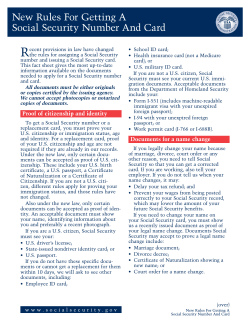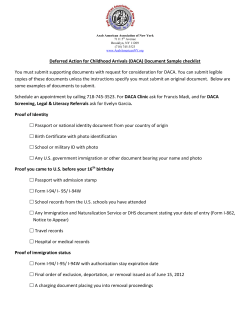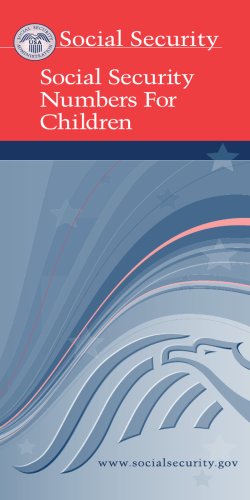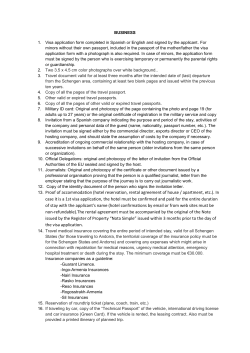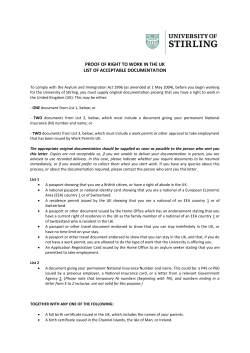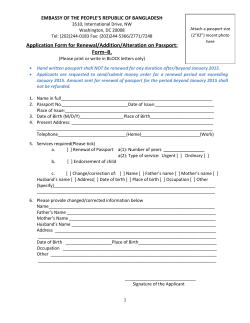
P New Numbers For Domestic Violence Victims
New Numbers For Domestic Violence Victims P eople in all walks of life can be victims of family violence or harassment, abuse or life-endangering situations. If you are a victim of family violence, Social Security may be able to help you. Public awareness campaigns stress how important it is for victims to develop safety plans that include gathering personal papers and choosing a safe place to go. Sometimes the best way to evade an abuser and reduce the risk of further violence may be to relocate and establish a new identity. Following these changes, it also may be helpful to get a new Social Security number. Although Social Security does not routinely assign new numbers, we will do so when evidence shows you are being harassed or abused or your life is endangered. Applying for a new number is a big decision. It may impact your ability to interact with federal and state agencies, employers and others. This is because your financial, medical, employment and other records will be under your former Social Security number and name (if you change your name). If you expect to change your name, please do so before applying for a new number. How to apply for a new number You must apply in person at any Social Security office. We will help you complete a statement explaining why you need a new number and an application for a new number. In addition, you must present: • Evidence documenting the harassment, abuse or life endangerment; • Your current Social Security number; • Evidence documents establishing your: —U.S. — citizenship or immigration status; —Age; — —Identity; — and —Evidence — of your legal name change if you have changed your name. Also, we will need to see documents showing you have custody of any children for whom you are requesting new numbers and documentation proving their U.S. citizenship, ages and identities. All documents must be either originals or copies certified by the issuing agency. We cannot accept photocopies or notarized copies of documents. We may use one document for two purposes. For example, we may use your U.S. passport as proof of both citizenship and identity. Or, we may use your U.S. birth certificate as proof of age and citizenship. However, you must provide at least two separate documents. We will mail your number and card as soon as we have all of your information and have verified your documents with the issuing offices. Citizenship or immigration status U.S. citizen: We can accept only certain documents as proof of U.S. citizenship. These include a U.S. birth certificate or a U.S. passport. Noncitizen: To prove your U.S. immigration status, show us your current immigration document such as your I-94, Arrival/Departure Record. If you are an F-1 or M-1 student, you also must show us your I-20, Certificate of Eligibility for Nonimmigrant Student Status. If you are a J-1 or J-2 exchange visitor, show us your DS-2019, Certificate of Eligibility for Exchange Visitor Status. Age U.S. born: You must present your birth certificate if it exists. If a birth certificate does not exist, we may be able to accept your: • Religious record made before age 5 showing the date of birth; • U.S. hospital record or birth; or • U.S. passport. Foreign born: You must present your foreign birth certificate if you have it or can get a copy within 10 business days. If you cannot get it, we may be able to accept your: • Foreign passport; • I-551, Permanent Resident Card (green card); or • I-94 Arrival/Departure Record. (over) New Numbers For Domestic Violence Victims Identity We can accept only certain documents as proof of identity. An acceptable document must be current (not expired) and show your name, identifying information and preferably a recent photograph. U.S. citizen: Social Security will ask to see a U.S. driver’s license, state-issued nondriver’s identification card or U.S. passport as proof of identity. If you do not have the specific documents we ask for, we will ask to see other documents, including: • Employee identification card; • School identification card; • Health insurance card (not a Medicare card); • U.S. military identification card. Noncitizen: Social Security will ask to see your current U.S. immigration documents. Acceptable immigration documents include your: • Form I-551, Permanent Resident Card (green card); • I-94, Arrival/Departure Record with your unexpired foreign passport; or • I-766, Employment Authorization Card (EAD, work permit) from DHS. Changing your name on your card We can accept only a court-order-approved legal name change document that supports your requested name change. Providing the evidence you need Blocking access to your record You can choose to block electronic access to your Social Security record. When you do this, no one, including you, will be able to get or change your personal information on the Internet or through our automated telephone service. If you block access to your record and then change your mind in the future, you can contact Social Security and ask us to unblock it. Go to www.socialsecurity.gov/blockaccess to block electronic access to your personal record. Contacting Social Security For more information and to find copies of our publications, visit our website at www.socialsecurity.gov or call toll-free, 1-800-772-1213 (for the deaf or hard of hearing, call our TTY number, 1-800-325-0778). We treat all calls confidentially. We can answer specific questions from 7 a.m. to 7 p.m., Monday through Friday. Generally, you’ll have a shorter wait time if you call during the week after Tuesday. We can provide information by automated phone service 24 hours a day. We also want to make sure you receive accurate and courteous service. That is why we have a second Social Security representative monitor some telephone calls. National Domestic Violence Hotline 1-800-799-SAFE (7233) (TTY) 1-800-787-3224 The best evidence of abuse comes from third parties, such as police or medical personnel, and describes the nature and extent of harassment, abuse or life endangerment. Other evidence may include court restraining orders and letters from shelters, family members, friends, counselors or others who have knowledge of the domestic violence or abuse. We will help you get any additional evidence needed. Printed on recycled paper Social Security Administration SSA Publication No. 05-10093 ICN 468615 Unit of Issue - HD (one hundred) September 2013 (Recycle prior editions)
© Copyright 2026
